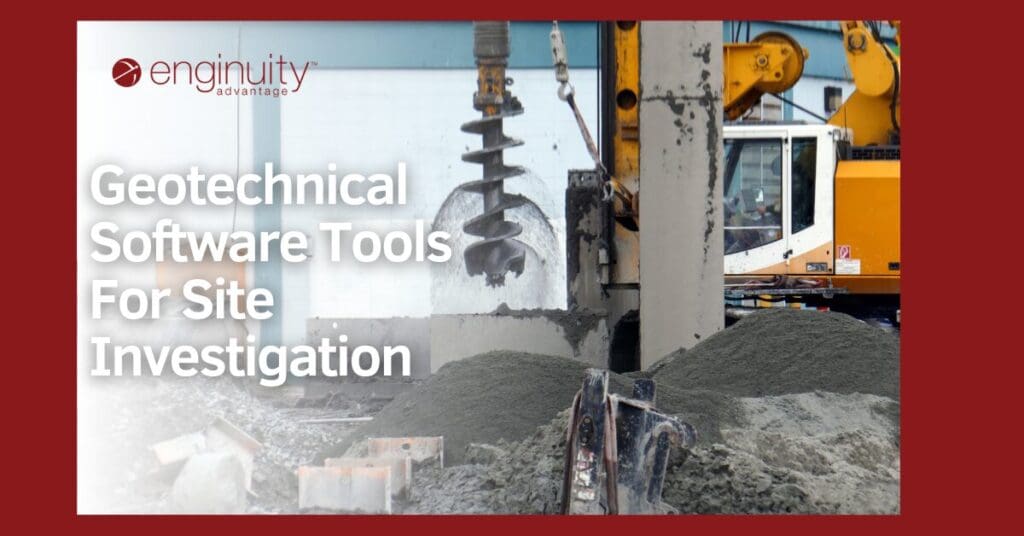Geotechnical Software Tools for Site Investigation

Geotechnical engineering is a critical field that involves the investigation and analysis of soil, rock, and subsurface conditions to ensure the safety and stability of construction projects. With the advancement of technology, geotechnical software tools have become indispensable in conducting efficient and accurate site investigations. These tools not only enhance the precision of geotechnical assessments but also streamline the entire process, from data collection to analysis and reporting. This article explores some of the leading geotechnical software tools available for site investigation and highlights how they contribute to the field, tying back to the expertise and resources offered by Enginuity Advantage.
The Role of Geotechnical Software in Site Investigation
Geotechnical software tools are designed to assist engineers in evaluating subsurface conditions and determining the suitability of a site for construction. These tools provide a range of functionalities, including soil and rock analysis, slope stability assessments, foundation design, and environmental impact evaluations. By leveraging these advanced technologies, geotechnical engineers can make informed decisions that enhance the safety and efficiency of construction projects.
Key Geotechnical Software Tools
- PLAXIS
PLAXIS is a leading geotechnical software used for the analysis of deformation and stability in soil and rock. It employs finite element and finite difference methods to simulate complex geotechnical problems. PLAXIS is widely used for tasks such as foundation analysis, excavation support, and tunneling projects. Its advanced modeling capabilities allow engineers to predict how soil and rock will behave under various conditions, ensuring the stability and safety of structures.
- GeoStudio
GeoStudio by Seequent is a comprehensive suite of geotechnical software that includes modules for slope stability (SLOPE/W), seepage analysis (SEEP/W), stress and deformation analysis (SIGMA/W), and more. GeoStudio’s integrated approach allows for the simultaneous analysis of multiple geotechnical aspects, providing a holistic view of site conditions. This integration is crucial for identifying potential issues and developing effective mitigation strategies.
- gINT
gINT by Bentley Systems is a powerful data management and reporting software specifically designed for geotechnical and geoenvironmental projects. gINT allows engineers to collect, manage, and report subsurface data efficiently. Its robust database capabilities enable the seamless integration of data from various sources, ensuring that all relevant information is available for analysis and decision-making.
- ROCSCIENCE Suite
ROCSCIENCE offers a suite of geotechnical software tools that cover a wide range of applications, including rock mechanics, slope stability, and foundation design. Tools such as RS2 (finite element analysis for soil and rock), Slide (slope stability analysis), and Settle3 (settlement analysis) are widely used in the industry. These tools are known for their user-friendly interfaces and powerful analytical capabilities, making them essential for geotechnical engineers.
- Geo5
Geo5 is another comprehensive geotechnical software suite that includes tools for foundation design, retaining wall analysis, slope stability, and more. Developed by Fine Software, Geo5 is known for its intuitive interface and detailed documentation, which helps engineers perform accurate and reliable analyses. The software’s modular design allows users to select specific tools based on their project requirements, making it a versatile choice for various geotechnical applications.
Benefits of Using Geotechnical Software
The use of geotechnical software tools in site investigations offers several benefits. These tools enhance the accuracy of geotechnical assessments by providing detailed simulations and analyses that account for complex subsurface conditions. They also improve efficiency by automating data collection, analysis, and reporting processes, allowing engineers to focus on interpretation and decision-making.
Furthermore, geotechnical software tools facilitate better communication and collaboration among project stakeholders. The ability to visualize and share detailed models and reports ensures that all parties have a clear understanding of site conditions and potential risks. This collaborative approach leads to more informed decision-making and ultimately contributes to the success of construction projects.
Leveraging Geotechnical Expertise with Enginuity Advantage
Enginuity Advantage understands the importance of using advanced geotechnical software tools in site investigations. With our comprehensive resources and expert guidance, we help businesses leverage these technologies to achieve accurate and efficient geotechnical assessments. By integrating cutting-edge software tools into your geotechnical processes, you can enhance the safety, stability, and success of your construction projects.
For more information on how Enginuity Advantage can support your geotechnical engineering needs, visit Enginuity Advantage. Let us help you navigate the complexities of site investigation with the best tools and expertise available.
Unlock Dream Careers & Elite Talent: Just One Click Away!


